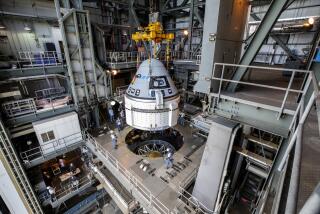Minor Troubles Plaguing Crew of Challenger
- Share via
HOUSTON — An air leak traced to a furnace and a loss of communications caused by a fire on the ground plagued the international crew of the space shuttle Challenger on Saturday, but officials said there was no threat to the astronauts or to their science mission.
Space agency officials said the leak caused the flow of oxygen and nitrogen gases from supply tanks to more than triple for a short time and forced the astronauts to search for the source of the loss of atmosphere.
Flight director Larry Bourgois said the problem was believed to be in a vent in one of five furnaces used to melt metals and glasses in the laboratory carried in Challenger’s cargo bay.
While Mission Control was checking the problem, a communications ground station at White Sands, N.M., suddenly lost contact with the spacecraft.
Bourgois said later that a small fire at the White Sands center knocked out power to two computers that keep Mission Control in contact with a satellite that normally relays communications between the ground and shuttle flights.
Power was restored to one of the computers, and communications resumed after about two hours.
The air leak was discovered when the flow of oxygen and nitrogen into the shuttle’s cabin suddenly increased from the normal rate of about half a pound an hour to more than two pounds per hour.
The astronauts, suspecting a regulator flaw, switched to a back-up regulator system, but the high flow rate continued.
Mission Control suspected a faulty valve in one of the furnaces and asked the astronauts to close the furnace door. Bourgois said the flow immediately dropped to a leak rate he classified as “very small.”
“We could go to the end of the mission and support this leak,” he said. “Essentially, there will be no mission impact.”
Officials said Challenger carries about 200 pounds of surplus oxygen, enough to overcome any loss from the small leak.
Challenger’s crew of eight, the largest ever, were working in two 12-hour shifts daily to keep experiments operating around the clock in the Spacelab module.
Officials in West Germany, which is paying NASA nearly $65 million to fly the 76 Spacelab experiments, were quoted by an interpreter as saying: “All the experiment systems are working perfectly.”
More to Read
Sign up for Essential California
The most important California stories and recommendations in your inbox every morning.
You may occasionally receive promotional content from the Los Angeles Times.













